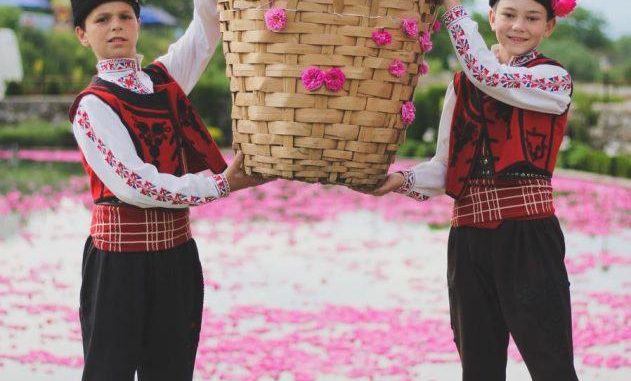
Written by travel writer, Bilyana from Owl Over The World.
Bulgaria is a country with rich culture and unique traditions. Bulgarians are very proud of them, and they have been passed on from generation to generation for years, if not decades or centuries. From chasing evil spirits away to dancing barefoot on smoldering embers, Bulgarian traditions showcased at these festivals in Bulgaria will leave you feeling ‘’WOW’’, and it is a guarantee that they will put a smile on your face.
Bulgarian Festival #1: Rose Festival
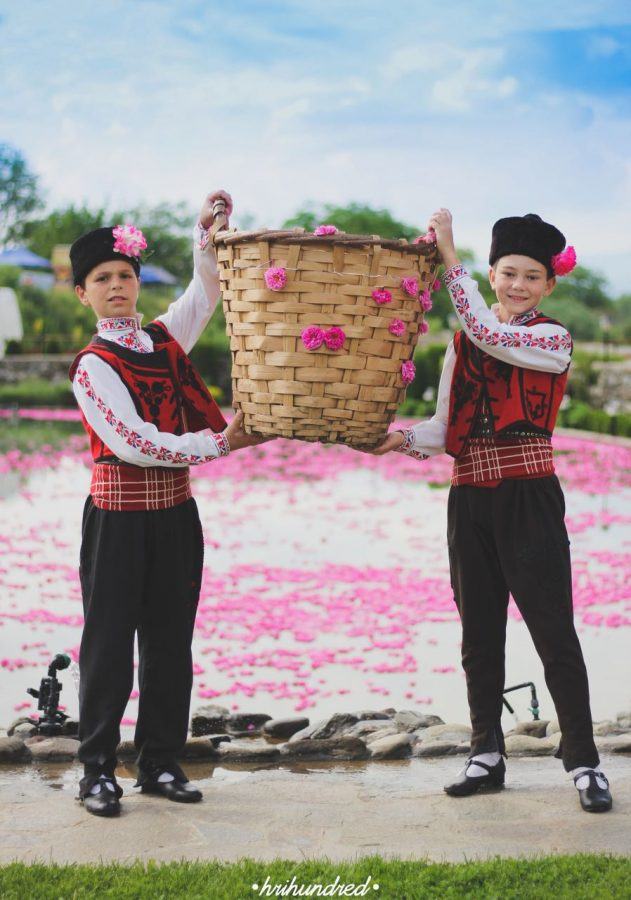
Bulgaria is famous for its roses. The country is one of the biggest producers of rose oil in the whole world. The Bulgarian ‘’attar’’ of roses is a major component in the perfumery business throughout the world. It is also used in the space industry, as a greasing component in space equipment, due to its resistance to temperature changes.
The Rose Festival is held in Kazanlak, which is part of the Rose Valley and is held every year, during the first weekend in June. The festival was first celebrated in 1903, since then it has been kept going by generations of enterprising people from the valley.Nowadays the festival has become an international event, visited by thousands of people, both locals and tourists. Three events during the festival are must
Nowadays the festival has become an international event, visited by thousands of people, both locals and tourists. Three events during the festival are a must-visit: the parade along the streets of the town, the election of Queen Rose, and the early morning ritual in the rose fields. You can also visit the Museum of Roses in Kazanlak.
Bulgarian Festival #2: Cherry Festival in Kyustendil
Taking place anually during two days in the second half of June in Kyustendil, which is known as Bulgaria’s “Fruit Garden”, the Cherry Festival is one of the greatest Bulgarian festivals. The celebration of the area’s fruit orchards started with the first national fruit exhibition in the country in 1896 and its popularity has only grown since then.
The Cherry Festivals is focused on, well… cherries. This tasty fruits and their gorgeous blossoms are the stuff of myths and beauty in many countries the world over. At the festival, you’ll find countless tables loaded with buckets of cherries, all part of a competitive exhibition. Additionally, there are also many different products made from cherries, from cherry cakes and jam to carved cherrywood. Even the tables themselves are part of a competition—the most beautiful table wins!
Bulgarian Festival #3: Nestinarstvo
Nestinarstvoto, which is fire dancing, is one of the oldest Bulgarian traditions. In the past, it was practiced in Thrace, and today is preserved only in three villages in the Strandzha Mountain – Bulgari, Brodilovo, and Kosti. According to some researchers, the ritual roots lay in Bulgaria’s pagan past and is derived from the cult of the Sun in the Thracians.
The day of the ritual starts with a dressing of fire-icons. Then with the procession, which includes the whole village, icons refer to the holy spring of St. Constantine, where the ritual washing of the stalk is conducted. After sunset, the people would build up a massive fire and dance traditional Bulgarian dance (Horo) until the fire dies and only embers remain. After that, the culmination of the tradition begins. Nestinari in a state of trance enter the circle with shouts, and the first one crosses the embers of the cross, and then the others
Nestinari who are now a state of trance enter the ring of fire with shouts, and the first one crosses the embers, and then the other Nestinari enter the circle. It is believed that due to being in a state of trance they don’t don’t feel the pain from the raging fire.
The festival is included in the UNESCO list of the Intangible Cultural Heritage. Today the ritual is best preserved in the village of Bulgari in Strandzha Mountain and is held every year on 3 June.
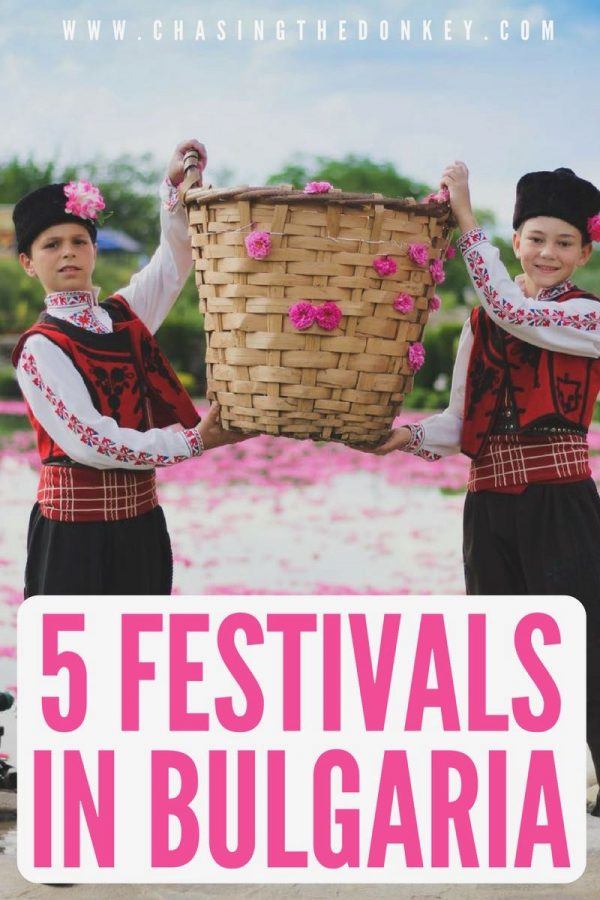
Bulgarian Festival #4: Surva
The International Festival of Masquerade Games ‘’Surva’’ in Pernik is the biggest one in Bulgaria and the Balkans, and it’s one of the greatest performances of traditional folk games and customs with masks in the world.
In the past, the ‘mummers’ are dressed with a mix of male and female clothes and scary masks. They hang from themselves bells and cowbells, they carry swords or sticks to scare away the barren winter and the evil spirits. Nowadays the festival is a joyful celebration which aims to recreate the past and to bring joy and fun to people. The festival is held every year on the last Friday, Saturday, and Sunday of January.
The festival is held annually on the last Friday, Saturday, and Sunday of January. Traditionally the festival involves about 6000 people from over 100 masquerade groups from all Bulgarian regions. People come to participate for the emotion and the fun.
Bulgarian Festival #5: International Bagpipe Festival in Gela
Arguably the most unusual of all major Bulgarian festivals is the International Bagpipe Festival, which takes place in the village of Gela in August. This is a traditional festival preserved by the Rhodope Mountains people and clans, aimed to promote their folklore and culture.
While many people associate bagpipes with Scotland, Bulgaria also has its very own version. Playing the Rhodope Mountains bagpipe (locally known as the Kaba Gaida), one of Bulgaria’s most significant folk music instruments, is a prerequisite for Bulgarian participants. The festival also attracts visitors from all over the world, including places like the Netherlands, France, Hungary, Sweden and even Japan. More than 100 bagpipers participate in the event, while visitor numbers exceed 15,000.
Bulgarian Festival #6: Rozhen Festival
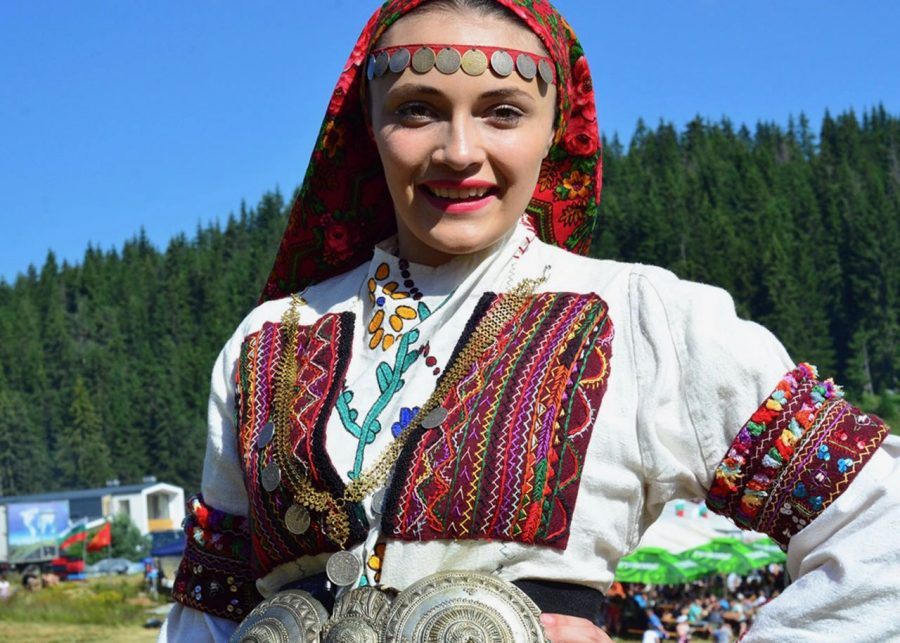
Rozhen National Folklore Festival showcases Bulgarian folklore and livestock. It’s performed on the meadows of Rozhen Pass, near Rozhen peak in Rhodopes Mountain. The goal of the festival is to popularize the Bulgarian folk dances and song art.
The fair presents the Bulgarian folk music, customs, dances, clothing, costumes, and rituals. Traditionally the fair begins with the Бела съм бела юначе (Bela sam bela yunache) song, the unofficial anthem of the Rhodopes Mountain. The festival is held for 2-3 days in August.
Bulgarian Festival #7: Lazaruvane
Not a huge gathering in one particular spot but rather a tradition that takes place in villages and towns all over the country, Lazaruvane is celebrated on St. Lazarus Day, the Saturday eight days before Easter. This ancient Bulgarian tradition announces the beginning of spring.
What’s so remarkable about this event is that it’s performed only by girls. On St. Lazarus Day, groups of girls (usually about 16 years old and unmarried) walk across their town, dressed in traditional clothing, signing folk songs and visiting every home in town. Symbolizing the growth of the girl, once this ritual has competed, a girl is deemed ready to get married.
Bulgarian Festival #8: Zheravna National Costume Festival
Zheravna is a village in the southeast part of Bulgaria. Every year since 2008 the village held the National Festival of Folk Costumes.
The participation in the festival is a voluntary act and those who want to join it have to respect its rules. The main rule is to be dressed in folk costume. It is forbidden to use some objects from the modern life. The use of a mobile phone is allowed only in the calling areas. The purpose of these rules is to strive to appreciate the day-to-day life of Bulgarians some 100-150 years ago.
Traditionally the festival is held for three days (Friday, Saturday, and Sunday) on the last weekend of August.
Bulgarian Festival #9: Carnival of Humour and Satire in Gabrovo
Known as Bulgaria’s capital of satire and humor, Gabrovo hosts the Carnival of Humour and Satire each year in mid-May. This is an incredibly fun festival, one of the best festivals in Bulgaria, especially if you like a good laugh.
Nothing is taking seriously during this carnival. Huge crowds fill the streets of Gabrovo, part of procession that slowly runs through the city center. There are cartoons and sculptures of significant events, famous people and local heroes. People are dressed up in all kinds of characters, from gypsies and musketeers to wizards and toreadors. Additionally, traditional Balkan music and dances accompany this most fun of Bulgarian festivals. Make sure to check it out if you’re in the country in May.
Bulgarian Festival #10: Pirin Sings Folklore Festival
One of the most important cultural festivals in Bulgaria is the Pirin Sings Folklore Festival. First organized in 1962, it is so fascinating because it has managed to successfully track, revive and protect cultural heritage in Bulgaria. The festival attracts a lively bunch of performers young and old, lovers of old traditions and ethnography, as well as tourist who simply want a glimpse of local Bulgarian culture.
Pirin Sings takes places in the middle of summer at the Predel Pass in the Rila and Pirin Mountains. People from all fourteen villages in the region gather at the festival for a couple of days of songs, dances, tales and stories, music and other folkloric fun.
A bonus festival (my favorite)
Bonus Festival in Bulgaria: The Blueberry Festival
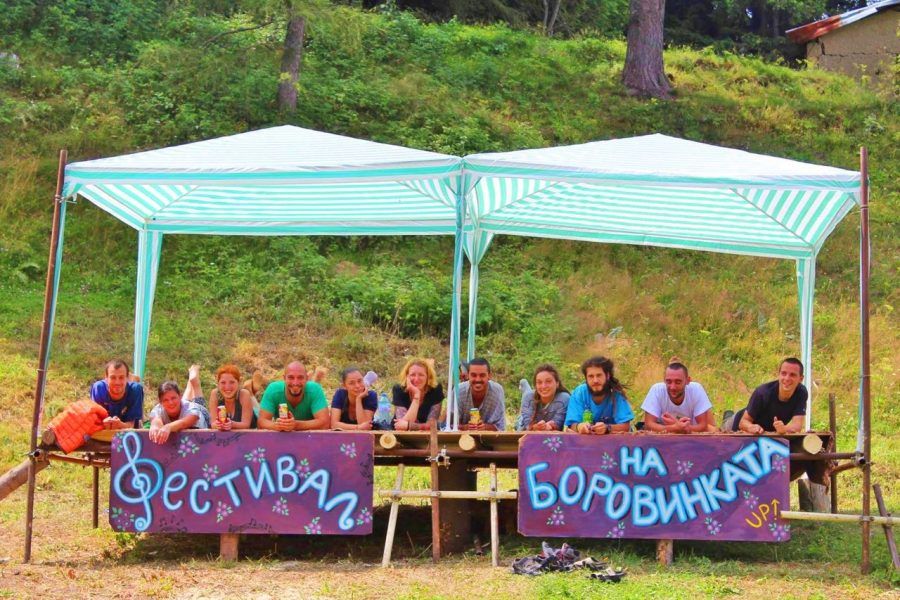
This Bulgarian festival is not at all famous, but I wanted to included it because it’s my favorite one. The festival is held high in the mountain at the beautiful Stara Planina, and more specifically in the Ambaritsa hut. This festival is a three-day program with a lot of music, games, fun, and of course as the name suggests it involves blueberries. (and the mekitsi ever). I went to the festival last year as a volunteer for one week. I meet a lot of awesome people and had a fabulous time.
The dates for this year’s one are not announced yet, so follow them on Facebook for up to date information.
Are you going to consider joining one of these festivals in Bulgaria? If so, which one will it be?
These Bulgarian festivals are just one of the reasons to visit the country. Bulgaria is an amazing place with so many places worth visiting. If you ask me when is the right time to visit Bulgaria, well, my answer would be NOW!
Main Photo: Festival of Authentic Folklore in Dorkovo
Other Bulgaria Travel Blogs You May Like
- Things To Do In Bulgaria
- Things To Do In Sofia
- Things To Do In Varna
- Best Day Trips From Sofia
- Bansko Ski Resort
- Bulgarian Festivals
- Rent A Car Bulgaria

Leave a Reply